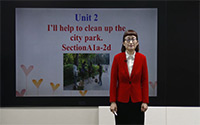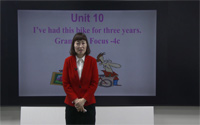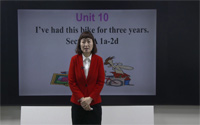课程内容
Unit 10《I've had this bike for three years.》(Section B 1a-2d)
Warming up
Talk about your hometown.
Where is your hometown?
Do you like your hometown?
What are some of the special places in your hometown?
Group work
1a. Check (√) the places or things you can find in your town or city.
______ a museum ______ a primary school
______ a bridge ______ a zoo
______ a park ______ a hill
______ a library ______ a river
1b. Listen and answer the questions.
1. Does Martin like Jenny's hometown?
2. Does Jenny still live in her hometown?
3. What is behind the science museum? What do people do there on weekends?
1c. Listen again and fill in the chart about the places in Jenny's hometowm.
| Place |
New or old? |
How long has it been there? |
| town library |
old |
for hundreds of years |
| science museum |
|
|
| restaurant down the street |
|
|
1d. Talk about your town/city with a partner.
A: My city is lovely.
B: What are some of the special places there?
A: Well, there's a concert hall there. It's been around for at least 20 years.
Warming up
How often do you visit your hometown?
What are the changes in your hometown?
2a. Answer the questions before you read. Then read the passage to find out if your answers are the same as in the passage.
1. Why do millions of Chinese leave the countryside every year?
2. How often do you think these people visit their hometowns?
3. What new buildings does the government usually build in towns and villages?
Using Previous Knowledge
We can often guess what a text is about by using what we already know. Answering questions before we read can also help us do this.
Listen and answer the questions:
1. Where do the people from countryside want to work?
2. Is there going to build a new school in his hometown?
Hometown Feelings
Some people still live in their hometown. However, others may only see it once or twice a year. Nowadays, millions of Chinese leave the countryside to search for work in the cities. Among these is Zhong Wei, a 46-year-old husband and father. He has lived in Wenzhou for the last 13 years. With a hard job in a crayon factory, he doesn't find time to visit his hometown. "I used to return home at least once a year, but I haven't been back for almost three years now. It's a shame, but I just don't have the time," he says.
Many people like Zhong Wei regard with great interest how their hometowns have changed.
Perhaps large hospitals and new roads have appeared. In many places, the government has also built new schools and sent teachers from the cities to help.
"I noticed that's true of my hometown," adds Zhong Wei. "Children have learned to read and count at my old primary school since the mid-20th century. But now the buildings are really old. I hear they're going to build a new school there." Zhong Wei thinks such developments are good, and he also knows that his hometown cannot always stay the same.
According to Zhong Wei, however, some things will never change. "In my hometown, there was a big old tree opposite the school. It is still there and has become quite a symbol of the place. Most of the children in my time liked to play together under that big tree, especially during the summer holidays. It was such a happy childhood. Our hometown has left many soft and sweet memories in our hearts."
Language points
1. Nowadays, millions of Chinese leave the countryside to search for work in the cities.
search作不及物动词时,意为“搜索;搜查”。短语search for意为“搜寻,找寻”。
e.g. He is searching for his sunglasses.
他正在找他的太阳镜。
【拓展】
作及物动词,意为“在……搜查”或“搜查”。
e.g. They searched the forest for the lost child.
他们在森林里寻找那个走失的小孩。
2. Among these is Zhong Wei, a 46-year-old husband and father.
among与between
among prep. 在三者或三者以上之间
e.g. Tom sits among the students.
汤姆坐在学生之间。
between prep. 在两者之间
e.g. Tom sits between Mary and Frank.
汤姆坐在玛丽和弗兰克之间。
复合形容词
a 46-year-old husband and father意为“一位46岁的丈夫和父亲”,相当于a husband and father of 46 years old。
four-year-old是一个复合形容词,特点“一是数词、名词、形容词之间要用连字符连接,二是数词后的名词用单数形式”。
e.g. Tom is a 10-year-old boy. = Tom is a boy of 10 years old.
汤姆是一个10岁的男孩。
Lily is an 8-year-old girl.
莉莉是一个8岁的女孩。
【拓展】
另一种类似的复合形容词作定语的结构是:数词+连字符+名词,或数词+名词的所有格。
e.g. a two-month holiday = a two months' holiday 一个为期两个月的假期。
ten-minute walk/drive/ride = ten minutes' walk/drive/ride
步行/开车/骑车10分钟的路程
3. ... It's a shame, but I just don't have the time, ...
shame不可数名词,意为“羞耻;羞愧;惭愧”与a连用,表示“可耻的人或事;可惜(遗憾)的事”。
e.g. He felt no shame for what he had done.
他不对自己所做过的事感到羞愧。
It's a shame (that) you can't stay for dinner.
你不能留下来吃晚饭,真遗憾。
【拓展】相关短语:
to one's shame 令人感到羞愧的是
feel shame at ... 因……而感到羞愧
in shame 羞愧的
have no shame 无羞耻心
4. Many people like Zhong Wei regard with great interest how their hometowns have changed.
regard及物动词,意为“将……认为;把……视为”。常用短语regard...as...意为“将……视为……;把……当做……”,as为介词,其后接名词或代词。
e.g. I regard you as my best friend.
我把你当做我最好的朋友。
We regard him as our brother.
我们把他当成兄弟看待。
5. Children have learned to read and count at my old primary school since the mid-20th century.
century可数名词,意为“世纪;百年”,其复数形式为centuries。
e.g the mid-20th century 20世纪中期
eighteenth-century writer 18世纪的作家
A hundred years is a century. 一百年是一个世纪。
6. According to Zhong Wei, however, some things will never change.
according to意为“依照,按照”,to为介词,后接名词、代词或从句。
e.g. He divided them into three groups according to age.
他把他们按年龄分成三组。
7. Most of the children in my time liked to play together under that big tree, especially during the summer holidays.
especially副词,意为“尤其;特别;格外”,在句中作状语,用于列举某个特例或某事物的特殊性。形容词especial“特别的,特殊的”。
e.g. Flowers are always welcomed, especially in winter.
鲜花总是受到欢迎,尤其是冬天。
2b. Find expressions in the passage that have the same meanings as these words nnd phrases.
1. look for __________
2. consider __________
3. across from __________
4. in one's opinion __________
5. go back __________
6. changes __________
7. area __________
2c. Comptete the summary with words from the passage. You may need to change the forms of the words.
Many Chinese people these days leave their ______ to work in the ______. They usually ______ to their hometowns one or two times a ______. Zhong Wei hasn't been back in close to three years. He has been working in a ______ factory in Wenzhou for the past 13 years.
People like him are ______ in how their hometowns are changing. New buildings are often built by the ______. Zhong Wei thinks these changes are ______ because things need to change in order to become better. But
he also thinks some things ______ change, and his hometown is still the place that holds all his childhood ______.
Group work
2d. Think of changes that happening in your town or city today. Which changes are generally good? Which changes could be seen as bad?
达标练习
1. I don't believe that this _____ boy can paint such a nice picture.
A. five years old B. five-years-old
C. five-year-old
2. According _____ Mr. Wang, we'll go on a trip this weekend.
A. in B. to C. at D. for
3. Look! She's standing _____ the ten children.
A. among B. between C. of D. from
4. - Jackie Chan has donated _____ dollars to charity.
- He is an example to us all.
A. thousand B. thousands
C. thousand of D. thousands of
5. - Can you give me some information about vacation trips?
- Why not _____ going to Hainan Island?
A. consider B. mind C. keep D. think
6. - Did you go to Kenli during the Peach Blossom Festival(桃花节)?
- Yes. The flowers were beautiful. Bees were flying _____ them.
A. in B. among C. between D. through
7. Nowadays millions of Chinese leave the countryside to _____ for the work in cities.
A. looked B. search C. find D. see
8. Mr. Jack _____ China for several years.
A. has been to B. has come to
C. has been in D. came to
Homework
Write something about changes that are happening in your hometown. You can use some sentences in 2d.






















